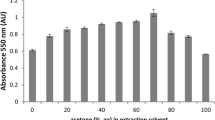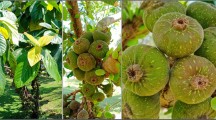Abstract
THE technique of paper chromatography devised by Consden et al.1 for the qualitative analysis of ammo-acids has since found wider spheres of application2. Bate-Smith3 described its application to anthocyanins, flavones and other polyphenolic substances.
This is a preview of subscription content, access via your institution
Access options
Subscribe to this journal
Receive 51 print issues and online access
$199.00 per year
only $3.90 per issue
Buy this article
- Purchase on Springer Link
- Instant access to full article PDF
Prices may be subject to local taxes which are calculated during checkout
Similar content being viewed by others

References
Consden, R., Gordon, A. H., and Martin, A. J. P., Biochem. J., 38, 224 (1944).
Consden, R., Nature, 162, 359 (1948).
Bate-Smith, E. C., Biochem. J., 43, xlix (1948).
Evans, R. A., Parr, W. H., and Evans, W. C., Biochem. J., 44, viii (1949).
Williams, R. J., and Kirby, H., Science, 107, 481 (1948).
Author information
Authors and Affiliations
Rights and permissions
About this article
Cite this article
EVANS, R., PARR, W. & EVANS, W. Paper Partition Chromatography of Phenolic Substances. Nature 164, 674–675 (1949). https://doi.org/10.1038/164674a0
Issue Date:
DOI: https://doi.org/10.1038/164674a0
This article is cited by
-
Degradation of sevin (1-naphthyl-N-methyl carbamate by Achrombacter sp.
Archiv f�r Mikrobiologie (1972)
-
�ber eine Kombination von Papierchromatographie und Ringofenmethode zur Untersuchung einiger toxikologisch interessanter organischer Stoffe
Mikrochimica Acta (1965)
-
New Pathways in the Oxidative Metabolism of Aromatic Compounds by Micro-Organisms
Nature (1960)
-
Partition chromatography and its use in the plant sciences
The Botanical Review (1959)
Comments
By submitting a comment you agree to abide by our Terms and Community Guidelines. If you find something abusive or that does not comply with our terms or guidelines please flag it as inappropriate.


